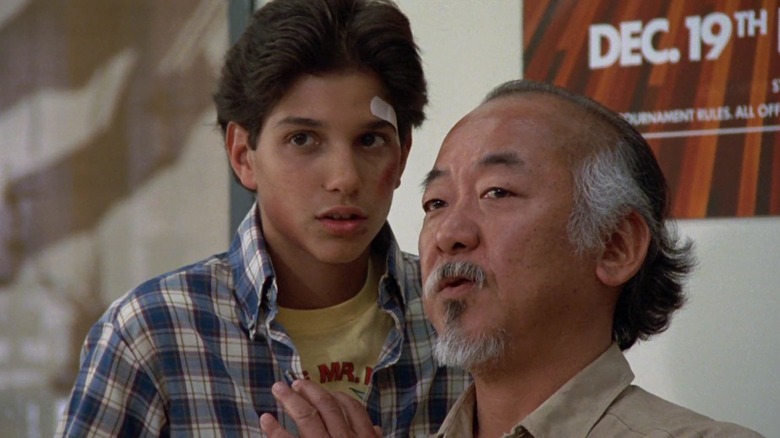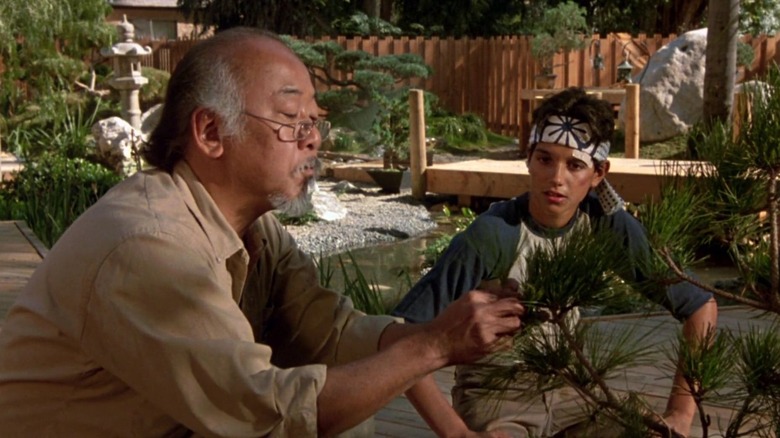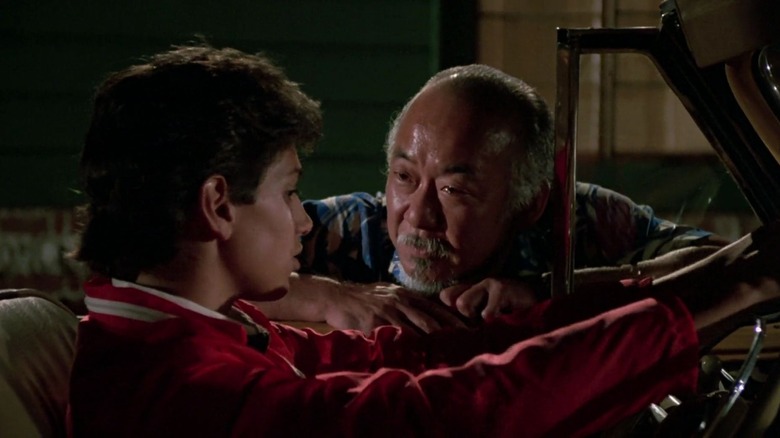The Studio Didn't Want Pat Morita As Mr. Miyagi In The Karate Kid
When an actor does such a good job at playing their role, it's hard to imagine anyone else taking their place — a testament to the casting director's final call. But it doesn't always mean that they were originally the first (or even third) choice for the role. Sometimes, the best option isn't so obvious.
Such was the case when Delphi II Productions began the process of casting Mr. Miyagi for "The Karate Kid." As the movie's star Ralph Macchio shared in his recent memoir, "Waxing On: The Karate Kid and Me" (which /Film's Jenna Busch spoke to the actor about), most of the team was doubtful about the late Pat Morita's ability to play Mr. Miyagi since the relatively serious character was a big change from his previous comical roles:
"The focus was on the dramatic side of the character. Finding an actor of range and depth who would be authentic. One who had the look and feel of a true martial arts master but could also reveal a warm and caring side."
Initially, Morita was barely even considered for the role. Instead, everyone seemed to be set on Toshiro Mifune ("Seven Samurai," "Rashomon) — after all, there was no doubt that he had the dramatic abilities. However, there were a couple of big problems: Mifune barely spoke any English, and according to Macchio, while he put on a Kurosawa-esque performance, his version of Mr. Miyagi lacked an "embraceable human side." So, the search continued.
Morita faced his own long journey to become Mr. Miyagi
As the studio kept looking for someone to play Mr. Miyagi, they made it a point to test out a wide variety of actors. Eventually, Pat Morita got a turn, too — and as he told the Television Academy Foundation, his initial meeting with director John Avildsen was surprisingly encouraging.
Several days later, Avildsen had a meeting with producer Jerry Weintraub, who had been vehemently opposed to even interviewing Morita on the basis of his past work. When Weintraub saw a recording of Avildsen's meeting with Morita, he was impressed and inquired about the actor's identity. The search for Mr. Miyagi had suddenly got a lot more promising, though Morita didn't have the role in the bag just yet.
The actor was met with the "Karate Kid" team five more times and was continually tested — as Morita would recall, "they want[ed] to see if I can do it again, ... they want[ed] to see if there's chemistry [with Macchio]." It was a long process, but eventually, all the work paid off. Weintraub was won over, Morita and Macchio proved their chemistry, and the pair were both given official confirmation of their roles. Plus, there was a small silver lining: experimentation during the interview process led to Morita's personal handkerchief becoming Daniel LaRusso's signature headband.
The Karate Kid's success led to typecasting
Unfortunately, not all that glitters is gold. While Morita rightfully won over the hearts of "Karate Kid" viewers, his daughter Aly Morita later reflected that the franchise's success led to typecasting; combined with the lack of available roles for Asian-American actors, her father found it hard to secure different types of roles. According to his daughter, Morita's fall after extreme success took a toll on him. In her own words, "[t]he weight and loneliness of fame ultimately destroyed him."
As for the actor's own perspective on the matter, Pat Morita told the Television Academy Foundation that as an actor, he was just happy to be in front of a camera, no matter if the role was typecast or not — though that excitement didn't go away when he landed an unfamiliar role, either. Still, his daughter's comments touch on a darker, often-ignored side to on-screen success: it's hard to break out of a typecast, so what happens to the actor — the person, not their career — when their signature role is no longer popular?


